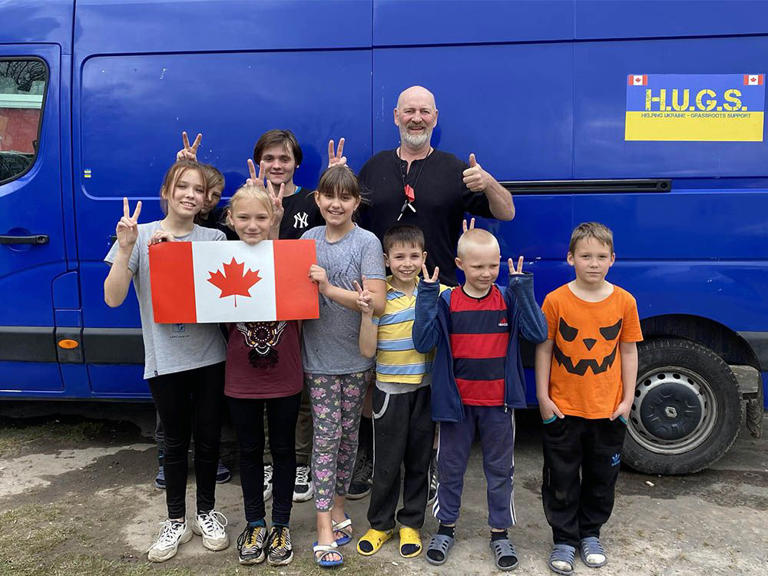After two weeks in the eastern region that’s become the war’s focus, the one-time member of the Princess Patricia’s Canadian Light Infantry’s second battalion said he’s never seen such heavy fighting.
“Today’s been a tough day, we’ve had a lot of assaults. We’ve been flying,” said the Saskatoon native, who wouldn’t give his name.
“I’ve been (in the Donbas) for the last two weeks and the last 24 hours has been the worst … it’s going to be a very s—-y night.”
The Canadian volunteer with the Ukrainian group Hospitallers Medical Battalion was speaking by phone from what he said was a makeshift field hospital 15 kilometres behind the front line.
But due to the chaos and fog of war “I don’t even know where I am (in the region),” said the man, who served in Afghanistan in 2008.
On Monday, the man said his unit had evacuated about 40 Ukrainian wounded, the majority of them soldiers “but we do have the odd civilian.”
That’s involved dashing into areas under heavy Russian fire to collect the wounded, treat them and transport them to field hospitals — a task not for the faint of heart, said the military vet.
“The majority of it is indirect fire — artillery, rockets, mortars,” he said.
“It’s bad, it’s an experience — you’re scared but you do what you have to do and get the hell out.”
But he said his medical colleagues, some of whom have been serving in the region during some of the eight years of war there preceding the latest Russian invasion, are a huge asset amid the danger.
“Fortunately, I’m working with a very skilled group and we watch each others’ backs,” said the Canadian.
During his stint near the front lines, the Saskatoon native said he’s carried an AK-74 assault rifle, though he’s yet to fire it, adding, “I hope it stays that way.”

He uttered an expletive in describing the Russians attacking Ukraine, and that he hopes some of Putin’s countrymen put an end to the Kremlin leader’s reign to halt the bloodbath.
As for the Ukrainian troops confronting the latest Russian offensive, he said “they have a will to fight, they won’t back down.”
As he finished a sentence, another vehicle pulled up outside the field hospital, possibly ending his break.
“We’ll see if there’s any (injured) people in it,” he said before ending the late-night call.
Meanwhile, on the other side of the country, Russia’s targeting of a western Ukrainian city won’t discourage the work of a Calgary-based relief group headquartered there, said its coordinator.
Lviv and its surroundings have been struck several times by Russian missiles in the past month, the latest attack occurring a week ago that killed at least seven people when unused military warehouses and a tire shop were hit.
But Calgarian Paul Hughes, who’s been in Ukraine aiding refugees since early March, said many in the city expect much worse to come as the Russians attempt to disrupt the entire country to weaken Ukraine’s defence of the eastern Donbas region.
“The tension is palpable — there’s not going to be a ground attack here because (the Russians) can’t break through so they’re just going to hammer away,” said Hughes, 57, with the group Helping Ukraine-Grassroots Support.
“It’s just a matter of time before Lviv gets the hell bombed out of it.”
The city that’s served as a hub for refugees fleeing the conflict has so far escaped the worst of the fighting that’s devastated the country’s north, east and south.
But it’s feared that its role as a transit node for weapons supplied by western nations to Ukraine and other military reasons will continue to draw fire from Russian forces, who have also struck numerous civilian targets.
Aid workers close to Hughes tried to assist casualties of the most recent missile strikes but were held back by authorities and the resultant chaos, said the Calgarian.
But Hughes said he and volunteers with his group and many others will continue to assist displaced Ukrainians in Lviv and other parts of the country.
“I’m planning on staying here for at least a year, there’s so much to do,” he said.
That work includes delivering medical and food supplies to refugees and survivors and transporting them to safety.
And it’s required constant vigilance when venturing near the war’s front lines, he said.
“We’re route-searching for the drivers, we look at where the Russians are at all times,” said Hughes.
(Edited: Michael/Carol Reviewed: Kejian)


